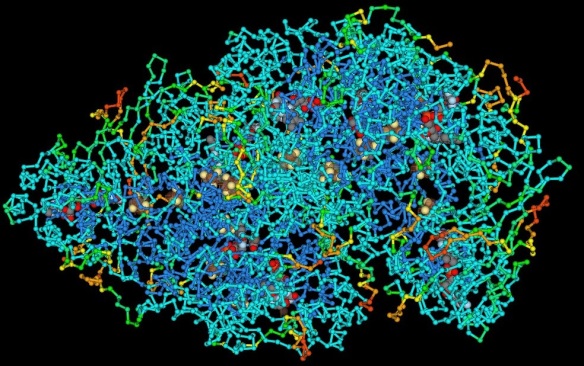The rhetorical question posed in the OP does not refute Darwinism.
To deny Darwinism is I think ridiculous. Evolution is the overwhelming consensus as the explanation for how life evolves. It doesn't mean that God did or didn't create all life, if he did then maybe he used evolution as the means to allow life to adapt and change. It's still a theory, not proved. As such, it can be and maybe should be challenged. But the rhetorical question used in the OP is IMHO pretty dumb.
You clearly have no concept of the insuperable statistics of polypeptide synthesis, which is the prime requisite of all life.
This is a schematic drawing of cytochrome-C, a polypeptide of approximately 500 amino acid residues in length. Its synthesis, whether very fast, or very slow, involved the precise addition of one specific amino acid after another, to the chain being constructed. Since there are 20 different amino acids in human polypeptides, the probability of assembling this sequence in the correct order is 1/20 x 1/20 x 1/20…. 500 times. This equates to 1 chance in 10 to the 650th power.
Moreover, this calculation does not even take into account:
- The probability of folding the chain in a precise manner
- How L-amino acids were isolated from a racemic mixture of both D and L components (They respectively rotate plane-polarized light right, and left.)
The very hateful and militant evolutionary biologist, Richard Dawkins, claims that any event with a probability of 1 in 10 to the 40th power is “impossible.” One chance in 10 to the 650th power is hundreds of orders of magnitude more impossible than Dawkins’ definition. But wait, it gets worse. Much, much worse.
This is only one of thousands of polypeptides (proteins and enzymes) in the human body. And many of those are much larger than a 500 link sequence. The largest is titin, a protein in muscles, which is 33,450 amino acid residues long.
Please tell me what is 1/20 to the 33,450th power?
And this is just for ONE PROTEIN. ONE of 10,000 or more.
Oh it gets worse. Each step in the original synthesis, according to your sophisticated Charles Darwin, had to be useful, to be "selected." That's one hell of a lot of useful intermediaries and why don't we see them elsewhere, performing those "useful" functions for which they were *selected*, hmmmm? You don't because it's all archaic nonsense.

